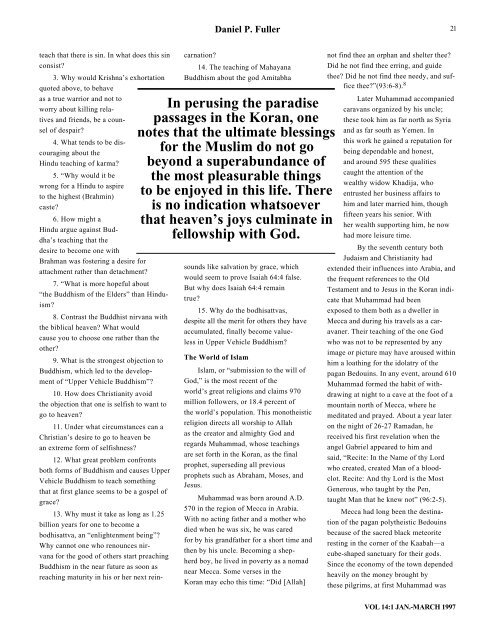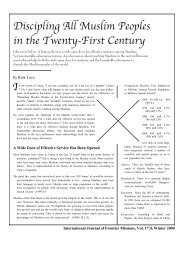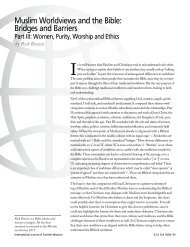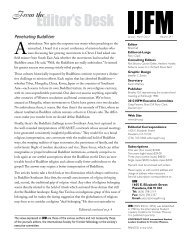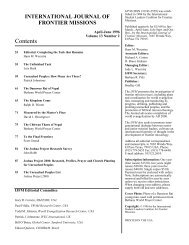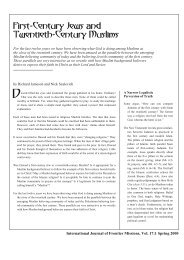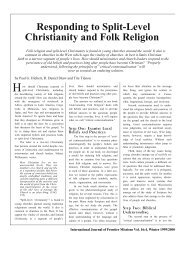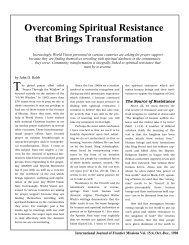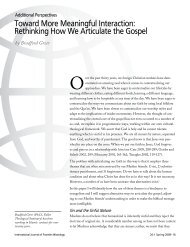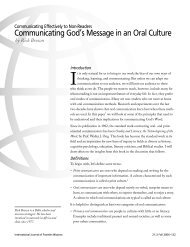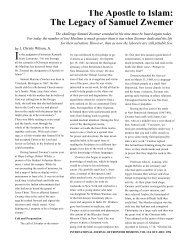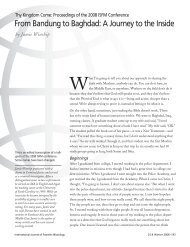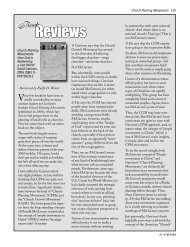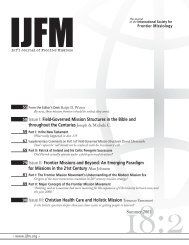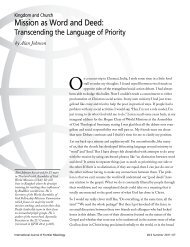20One’s <strong>Future</strong> <strong>in</strong> H<strong>in</strong>duism, <strong>Buddhism</strong> <strong>and</strong> <strong>Islam</strong>as <strong>in</strong>dividuals. Also necessary is a religion<strong>in</strong> which men <strong>and</strong> women can participatefully without becom<strong>in</strong>g monks ornuns but can carry on the ord<strong>in</strong>aryvocations essential for society’s wellbe<strong>in</strong>g.The subsequent changes both <strong>in</strong> theorig<strong>in</strong>al “Teach<strong>in</strong>g of the Elders” <strong>and</strong><strong>in</strong> the development of Mahayana <strong>Buddhism</strong>demonstrate how <strong>Buddhism</strong>added those features for which peopleyearn. As a result the teach<strong>in</strong>g regard<strong>in</strong>gthe foremost bodhisattvas of Mahayana<strong>Buddhism</strong> comes close to compet<strong>in</strong>gwith the Bible’s teach<strong>in</strong>g that Godwill rejoice with his whole heart <strong>and</strong>soul to work for the welfare of the peoplewho wait for him. That the greatBodhisattva, Amitabha, will br<strong>in</strong>g to paradisea person who does noth<strong>in</strong>g morethan meditate on his name for one daybefore death, sounds as if div<strong>in</strong>ebless<strong>in</strong>g could be received by grace. It isopen to abuse, however, by those whowish to live s<strong>in</strong>fully dur<strong>in</strong>g this life butnevertheless spend eternity <strong>in</strong> paradise—providedthey could accurately predictwhen they would die. I certa<strong>in</strong>lydo not suggest that all who revere Amitabhaare like that, for the teachers ofMahayana <strong>Buddhism</strong> urge people to befull of good works <strong>and</strong> to aspire tobecome bodhisattvas themselves.Nevertheless the problem aris<strong>in</strong>gfrom the possible abuse of Amitabha’sgrace does exist, which could neverarise with the God of the Bible, whoworks for those who simply wait forhim. Wait<strong>in</strong>g for God means bank<strong>in</strong>gone’s hope for an eternity of happytomorrows exclusively upon what Godhas promised to do; it means hav<strong>in</strong>ghim as one’s hope for the future. Accord<strong>in</strong>gto Psalm 33:20, “We wait <strong>in</strong> hopefor the Lord; he is our help <strong>and</strong> ourshield.” A pronounced change of conductthen occurs <strong>in</strong> those hav<strong>in</strong>g such confidence<strong>in</strong> what the lov<strong>in</strong>g <strong>and</strong>supreme Creator-God of the universe willdo for them, for such a hope is theroot cause of all virtuous liv<strong>in</strong>g. PeopleINTERNATIONAL JOURNAL OF FRONTIER MISSIONSwho confidently wait for God to br<strong>in</strong>gthem the desired fulfillment for theirlives will not abuse others <strong>and</strong> use themas means whereby they might ga<strong>in</strong>some happ<strong>in</strong>ess for the future. Insteadthey seek to serve others, becausethey know that God will provide for everyneed. All would feel at ease liv<strong>in</strong>galongside a person with such a hope <strong>in</strong>God.So the Bible teaches that the conditionpeople must fulfill <strong>in</strong> order tohave the lov<strong>in</strong>g God work for them is notto wait for him just for one day but tomake wait<strong>in</strong>g on him their purpose fromthe time they first trust him untildeath. To be sure, the Christian believes<strong>in</strong> the validity of death bed conversions,for Jesus told the thief on the crosswho believed <strong>in</strong> him that he woulddwell with him that very day <strong>in</strong> paradise(Luke 23:43). But the Bible gives noencouragement whatsoever to th<strong>in</strong>k thatone could live s<strong>in</strong>fully for most of life<strong>and</strong> then be assured of paradise by th<strong>in</strong>k<strong>in</strong>gabout God for a day or so beforedeath.An important advantage Christianityhas over Mahayana <strong>Buddhism</strong> isthat people need never feel ashamedto go to heaven. In Mahayana <strong>Buddhism</strong> aperson could never refuse rebirthwithout feel<strong>in</strong>g guilty that <strong>in</strong> so do<strong>in</strong>g heor she was be<strong>in</strong>g selfish by deny<strong>in</strong>gothers help so they too could f<strong>in</strong>d paradise.But there is no re<strong>in</strong>carnationtaught <strong>in</strong> the Bible: “[A person] is dest<strong>in</strong>edto die once” (Heb. 9:27). ThereforeChristians need never choosebetween enjoy<strong>in</strong>g heaven <strong>and</strong> act<strong>in</strong>glov<strong>in</strong>gly toward others.We also noted the tendency <strong>in</strong><strong>Buddhism</strong> toward a personal transcendence.Thus Buddha himself becamepersonalized, even though much of his<strong>in</strong>dividuality may have been lost <strong>in</strong>the <strong>in</strong>def<strong>in</strong>ite nirvana. Here<strong>in</strong> lies Christianity’sgreatest advantage overMahayana <strong>Buddhism</strong>: it explicitly teachespeople to worship a liv<strong>in</strong>g Lord now<strong>and</strong> to look forward to the enjoyment of aclose family relationship with him foreternity.Dur<strong>in</strong>g his life on earth Jesus wassubjected to much suffer<strong>in</strong>g, personallyexperienc<strong>in</strong>g all the hurts life canbr<strong>in</strong>g. So we Christians “do not havea High Priest who is unable to sympathizewith our weaknesses, but we haveone who has been tempted <strong>in</strong> every way,just as we are, yet without s<strong>in</strong>” (Heb.4:15). Indeed, <strong>in</strong> Mahayana <strong>Buddhism</strong>there are highly personal be<strong>in</strong>gs whohave experienced the full range of suffer<strong>in</strong>gdur<strong>in</strong>g their <strong>in</strong>numerable re<strong>in</strong>carnations.Amitabha, for example, dwells <strong>in</strong>a l<strong>and</strong> one step removed from nirvana.He rema<strong>in</strong>s there because he stillwants to use his vast store of merit,constantly <strong>in</strong>creased by his unselfishness<strong>in</strong> postpon<strong>in</strong>g nirvana for himself, tobr<strong>in</strong>g millions <strong>and</strong> millions of people tohis place next door to nirvana–theultimate hope <strong>in</strong> <strong>Buddhism</strong>.So the impersonal <strong>and</strong> <strong>in</strong>dividual-suppress<strong>in</strong>gnirvana is still held to bethe f<strong>in</strong>al goal of salvation, eventhough the history of <strong>Buddhism</strong> givesample evidence that its adherentsyearn not for cessation of <strong>in</strong>dividualitybut rather for contact with a highlypersonal, transcendent be<strong>in</strong>g. Hence thisbasic tension, ly<strong>in</strong>g at the very heartof <strong>Buddhism</strong>, rema<strong>in</strong>s unresolved.In Christianity, however, thistension is resolved. Accord<strong>in</strong>g to Revelation21:1-5, the Christian will f<strong>in</strong>allybe <strong>in</strong> the closest fellowship with God,who “will wipe every tear from theireyes.” There will be no more death ormourn<strong>in</strong>g or cry<strong>in</strong>g or pa<strong>in</strong>, for theold order of th<strong>in</strong>gs has passed away.Discussion Questions1. Contrast the bases for the experienceof peace as set forth <strong>in</strong> Christianity<strong>and</strong> H<strong>in</strong>duism. Which would youprefer, <strong>and</strong> why?2. Though H<strong>in</strong>duism sees good <strong>and</strong>bad as merged together <strong>in</strong> Brahman,the impersonal, ultimate reality underly<strong>in</strong>gall th<strong>in</strong>gs, nonetheless it does
Daniel P. Fuller21teach that there is s<strong>in</strong>. In what does this s<strong>in</strong>consist?3. Why would Krishna’s exhortationquoted above, to behaveas a true warrior <strong>and</strong> not toworry about kill<strong>in</strong>g relatives<strong>and</strong> friends, be a counselof despair?4. What tends to be discourag<strong>in</strong>gabout theH<strong>in</strong>du teach<strong>in</strong>g of karma?5. “Why would it bewrong for a H<strong>in</strong>du to aspireto the highest (Brahm<strong>in</strong>)caste?6. How might aH<strong>in</strong>du argue aga<strong>in</strong>st Buddha’steach<strong>in</strong>g that thedesire to become one withBrahman was foster<strong>in</strong>g a desire forattachment rather than detachment?7. “What is more hopeful about“the <strong>Buddhism</strong> of the Elders” than H<strong>in</strong>duism?8. Contrast the Buddhist nirvana withthe biblical heaven? What wouldcause you to choose one rather than theother?9. What is the strongest objection to<strong>Buddhism</strong>, which led to the developmentof “Upper Vehicle <strong>Buddhism</strong>”?10. How does Christianity avoidthe objection that one is selfish to want togo to heaven?11. Under what circumstances can aChristian’s desire to go to heaven bean extreme form of selfishness?12. What great problem confrontsboth forms of <strong>Buddhism</strong> <strong>and</strong> causes UpperVehicle <strong>Buddhism</strong> to teach someth<strong>in</strong>gthat at first glance seems to be a gospel ofgrace?13. Why must it take as long as 1.25billion years for one to become abodhisattva, an “enlightenment be<strong>in</strong>g”?Why cannot one who renounces nirvanafor the good of others start preach<strong>in</strong>g<strong>Buddhism</strong> <strong>in</strong> the near future as soon asreach<strong>in</strong>g maturity <strong>in</strong> his or her next re<strong>in</strong>carnation?14. The teach<strong>in</strong>g of Mahayana<strong>Buddhism</strong> about the god AmitabhaIn perus<strong>in</strong>g the paradisepassages <strong>in</strong> the Koran, onenotes that the ultimate bless<strong>in</strong>gsfor the Muslim do not gobeyond a superabundance ofthe most pleasurable th<strong>in</strong>gsto be enjoyed <strong>in</strong> this life. Thereis no <strong>in</strong>dication whatsoeverthat heaven’s joys culm<strong>in</strong>ate <strong>in</strong>fellowship with God.sounds like salvation by grace, whichwould seem to prove Isaiah 64:4 false.But why does Isaiah 64:4 rema<strong>in</strong>true?15. Why do the bodhisattvas,despite all the merit for others they haveaccumulated, f<strong>in</strong>ally become valueless<strong>in</strong> Upper Vehicle <strong>Buddhism</strong>?The World of <strong>Islam</strong><strong>Islam</strong>, or “submission to the will ofGod,” is the most recent of theworld’s great religions <strong>and</strong> claims 970million followers, or 18.4 percent ofthe world’s population. This monotheisticreligion directs all worship to Allahas the creator <strong>and</strong> almighty God <strong>and</strong>regards Muhammad, whose teach<strong>in</strong>gsare set forth <strong>in</strong> the Koran, as the f<strong>in</strong>alprophet, supersed<strong>in</strong>g all previousprophets such as Abraham, Moses, <strong>and</strong>Jesus.Muhammad was born around A.D.570 <strong>in</strong> the region of Mecca <strong>in</strong> Arabia.With no act<strong>in</strong>g father <strong>and</strong> a mother whodied when he was six, he was caredfor by his gr<strong>and</strong>father for a short time <strong>and</strong>then by his uncle. Becom<strong>in</strong>g a shepherdboy, he lived <strong>in</strong> poverty as a nomadnear Mecca. Some verses <strong>in</strong> theKoran may echo this time: “Did [Allah]not f<strong>in</strong>d thee an orphan <strong>and</strong> shelter thee?Did he not f<strong>in</strong>d thee err<strong>in</strong>g, <strong>and</strong> guidethee? Did he not f<strong>in</strong>d thee needy, <strong>and</strong> sufficethee?”(93:6-8). 8Later Muhammad accompaniedcaravans organized by his uncle;these took him as far north as Syria<strong>and</strong> as far south as Yemen. Inthis work he ga<strong>in</strong>ed a reputation forbe<strong>in</strong>g dependable <strong>and</strong> honest,<strong>and</strong> around 595 these qualitiescaught the attention of thewealthy widow Khadija, whoentrusted her bus<strong>in</strong>ess affairs tohim <strong>and</strong> later married him, thoughfifteen years his senior. Withher wealth support<strong>in</strong>g him, he nowhad more leisure time.By the seventh century bothJudaism <strong>and</strong> Christianity hadextended their <strong>in</strong>fluences <strong>in</strong>to Arabia, <strong>and</strong>the frequent references to the OldTestament <strong>and</strong> to Jesus <strong>in</strong> the Koran <strong>in</strong>dicatethat Muhammad had beenexposed to them both as a dweller <strong>in</strong>Mecca <strong>and</strong> dur<strong>in</strong>g his travels as a caravaner.Their teach<strong>in</strong>g of the one Godwho was not to be represented by anyimage or picture may have aroused with<strong>in</strong>him a loath<strong>in</strong>g for the idolatry of thepagan Bedou<strong>in</strong>s. In any event, around 610Muhammad formed the habit of withdraw<strong>in</strong>gat night to a cave at the foot of amounta<strong>in</strong> north of Mecca, where hemeditated <strong>and</strong> prayed. About a year lateron the night of 26-27 Ramadan, hereceived his first revelation when theangel Gabriel appeared to him <strong>and</strong>said, “Recite: In the Name of thy Lordwho created, created Man of a bloodclot.Recite: And thy Lord is the MostGenerous, who taught by the Pen,taught Man that he knew not” (96:2-5).Mecca had long been the dest<strong>in</strong>ationof the pagan polytheistic Bedou<strong>in</strong>sbecause of the sacred black meteoriterest<strong>in</strong>g <strong>in</strong> the corner of the Kaabah—acube-shaped sanctuary for their gods.S<strong>in</strong>ce the economy of the town dependedheavily on the money brought bythese pilgrims, at first Muhammad wasVOL 14:1 JAN.-MARCH 1997


